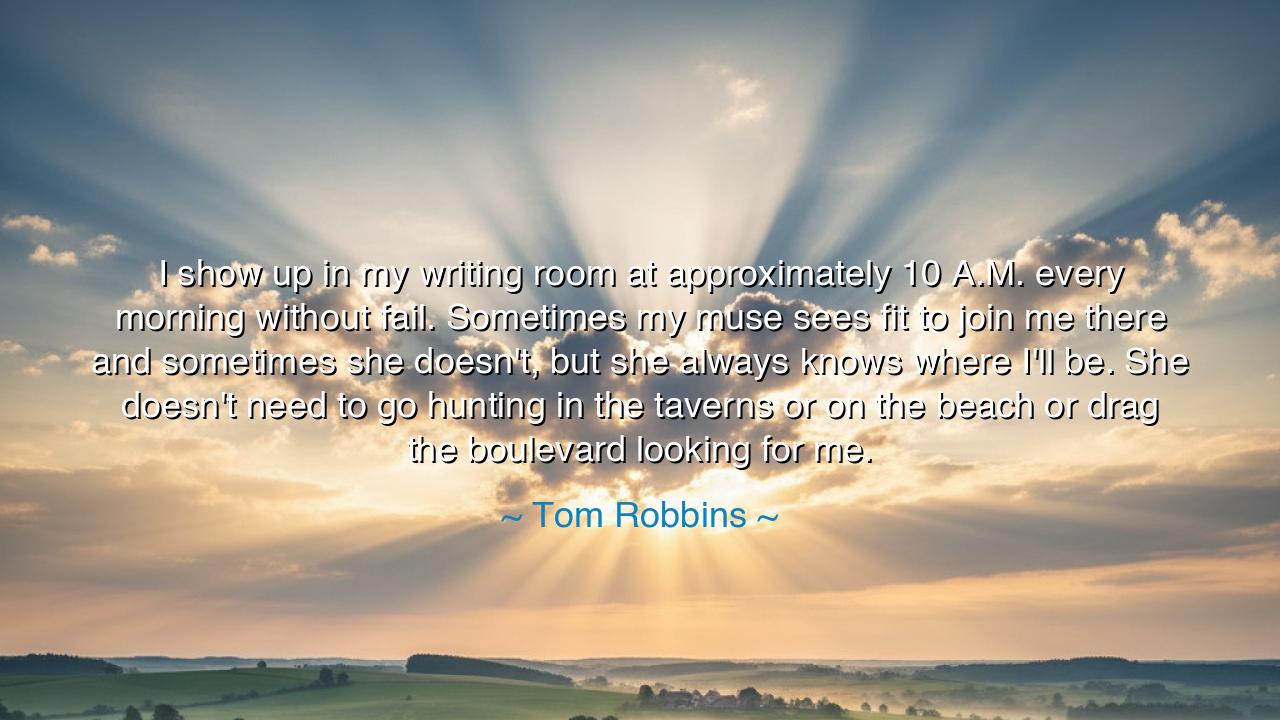
I show up in my writing room at approximately 10 A.M. every
I show up in my writing room at approximately 10 A.M. every morning without fail. Sometimes my muse sees fit to join me there and sometimes she doesn't, but she always knows where I'll be. She doesn't need to go hunting in the taverns or on the beach or drag the boulevard looking for me.






Hear the wisdom of Tom Robbins, the teller of strange tales and prophet of imagination, who declared: “I show up in my writing room at approximately 10 A.M. every morning without fail. Sometimes my muse sees fit to join me there and sometimes she doesn’t, but she always knows where I’ll be. She doesn’t need to go hunting in the taverns or on the beach or drag the boulevard looking for me.” Within these words lies a truth that echoes through the ages: that inspiration is not a wild and lawless spirit to be chased endlessly, but a companion who must know where to find you, awaiting her arrival in the stillness of discipline.
The ancients knew of the muse—those divine daughters of Mnemosyne who inspired poets, musicians, and philosophers. But they also knew that the muse favored those who prepared themselves, who showed reverence through ritual and constancy. Hesiod, in his Theogony, begins by invoking the Muses, but he does so after long years of tending sheep and shaping verses, faithful in his practice. Robbins speaks with the same wisdom: that the muse does not often descend into taverns or distractions, but appears where she is honored daily, in the writing room, in the temple of effort.
Consider the story of Leonardo da Vinci. Many picture him as a man seized by sudden sparks of genius, yet his brilliance came from countless hours of sketching, dissecting, measuring, and returning again and again to his craft. Genius visited him not because he wandered aimlessly, but because he built a steady dwelling where genius might take root. Robbins, sitting at his desk at 10 A.M., embodies this same creed: greatness does not chase the whimsical, it waits faithfully in the place of labor until inspiration joins it.
His words carry also a rebuke to idleness. Many wait endlessly for the perfect moment to create, saying, “I must walk the beach, I must seek distraction, I must wait until inspiration seizes me.” But Robbins teaches that such a life leads only to waste. The muse is like a bird: she alights where she knows there is constancy. If she comes and finds no one waiting, she may pass by forever. If she comes each day and sees the writer ready, pen in hand, she will be more likely to stay, for she honors faithfulness.
Yet Robbins admits a deeper truth: even with all discipline, the muse does not always arrive. Some mornings she sits silent, withholding her gifts. But this too is sacred, for it reminds us that the work must continue regardless. The farmer plows even when the sky is clouded, for the harvest cannot wait upon perfection. The writer, the painter, the thinker must do the same: labor daily, trusting that inspiration, though fickle, will return.
The lesson is plain: do not chase the muse into chaos, but build for her a dwelling and return to it without fail. Make of your writing room, or your studio, or your workshop, a temple of constancy. Sit down at the appointed hour, whether dawn, noon, or night, and wait with patience. Sometimes she will arrive with blazing fire, sometimes only with a whisper—but she will always know where to find you.
Practically, take Robbins’ teaching to heart. Choose a place, choose an hour, and return to it daily. Do not demand brilliance each time; instead, offer your presence, your effort, your faith. Let your discipline be the beacon that calls inspiration home. When you feel restless, remember: the muse does not seek you in the tavern, nor on the boulevard, but in the quiet space you have dedicated to her.
And so I say to you, O listener: honor the muse not with chasing, but with waiting. Build her altar in the daily rhythm of your labor. For genius is not lightning alone—it is the fire that burns because you tend it every morning. Be steadfast, and the muse will find you, not as a stranger, but as a faithful companion, returning always to the place where you are ready.






AAdministratorAdministrator
Welcome, honored guests. Please leave a comment, we will respond soon